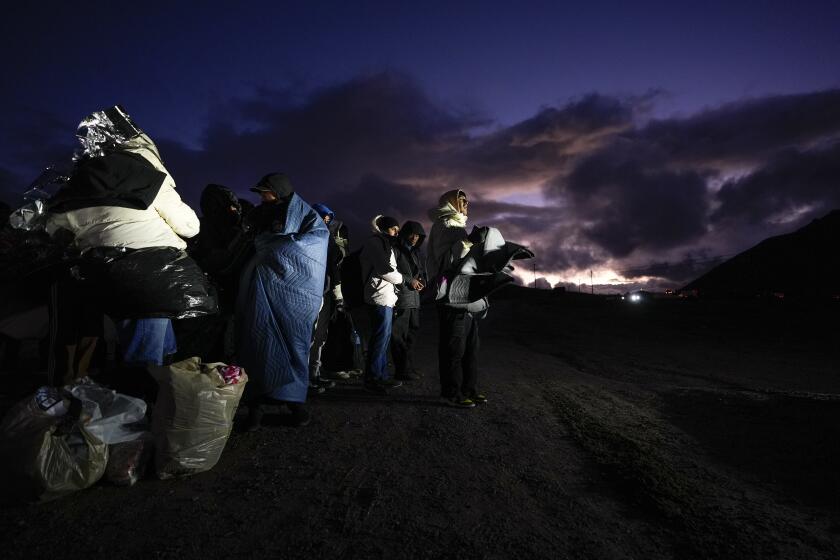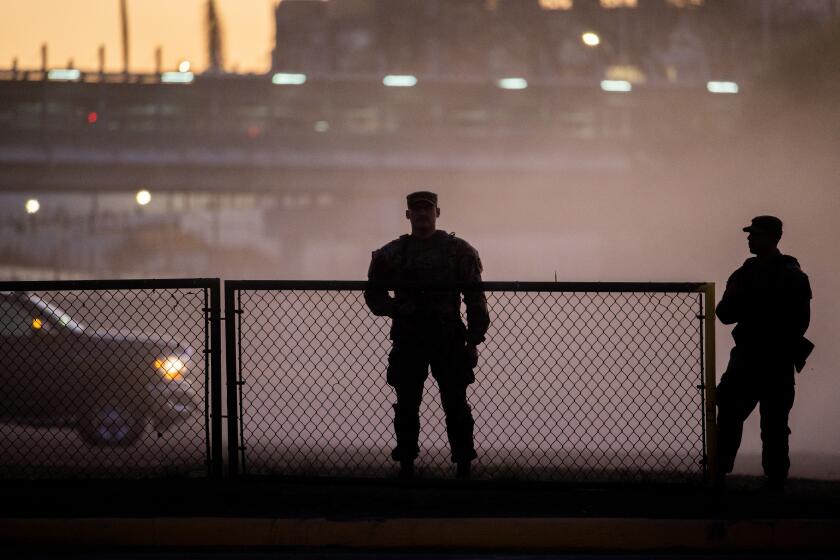Is Biden about to close the border in the name of election year politics?

- Share via
Multiple news sources report that President Biden is considering implementing executive action to try to close the U.S.-Mexico border, including to asylum seekers. It would be an extreme move, and a violation of the Refugee Act of 1980 and the country’s international obligation to protect those fleeing persecution. Only one other president — Donald Trump — has blatantly breached that obligation before. With the COVID-19 pandemic as a pretext, Trump invoked Title 42 of the U.S. Code, which allowed him to curb migration in the name of public health.
Biden, who came into office harshly criticizing his predecessor’s anti-immigrant policies, now seems poised to resurrect them. Administration sources concede that the president’s border plans are driven by politics, the belief that the immigration situation is “an election liability.”
This view is no surprise. We’ve been fed a narrative that the border is in crisis, overwhelmed by an unprecedented number of immigrants who pose a grave danger to the health and safety of the nation. But that narrative is false: The border is manageable, and rather than being a danger to Americans, immigrants are a net positive economically and socially.
Should migrants ‘get in line and wait their turn’? What if there is no line? What if we changed that?
Although the number of immigrants arriving at the southern border is high — 2.48 million were “encountered” by authorities in the U.S. between October 2022 and September 2023 — it is not unprecedented; there are comparable numbers from 2000. But, it gives a very partial picture to consider such figures without context.
Consider that the 2.48 million immigrants from last year is less than 1% of the U.S. population. Compare that with Poland which took in Ukrainian refugees at three times that rate and Costa Rica, which has taken in 10 times as many refugees per capita as the United States.
The United States also takes in far fewer migrants than countries significantly less wealthy. Low- and middle-income countries host 75% of the world’s refugees and displaced persons, while the U.S. and other wealthy countries only host 25%.
Greg Abbott’s policies are killing refugees trying to flee across the border. Many voters oppose his methods but appreciate that he takes the crisis seriously.
But more importantly, the idea that immigrants are “detrimental to the interests of the United States,” which is the statutory basis that would be relied upon to close the border, has been debunked. Study after study documents that immigrants benefit rather than harm the U.S.
A recently released economic and budget forecast by the nonpartisan Congressional Budget Office predicted an increase of $7 trillion in gross domestic product and of $1 trillion in revenues as a result of immigration. In a “60 Minutes” interview Federal Reserve Chair Jerome Powell noted that the increase of immigrant workers post-pandemic was a significant factor in the country’s improved economic outlook, including the easing of inflation.
Immigrants who entered the U.S. through one of Biden’s “parole programs” — which Republican politicians have sought to end via legislation and litigation — filled a crucial need in industries such as construction, transportation and manufacturing that have experienced daunting labor shortages.
Illicit imports of the opioid drug responsible for a fatal overdose crisis largely come from Mexico. But U.S. citizens bring most of it through legal ports of entry.
And contrary to the belief that immigrants are freeloaders, their contributions outstrip any benefits they might receive. The Institute on Taxation and Economic Policy found that undocumented immigrants, who are essentially ineligible for public benefits, pay an estimated $11.74 billion a year in state and local taxes. The facts are the same for immigrants who are entitled to public benefits. A study carried out by the U.S. Department of Health and Human Services showed that between 2005 and 2014 refugees and asylees contributed $63 billion more in revenues than they used in services.
Immigrants are accused of being a threat because of their propensity for criminality. The arrest of a Venezuelan migrant for killing a nursing student in Athens, Georgia, has amplified the issue in the news media this week. But a supposed link between immigrants and crime has also been refuted by research. A recent Stanford study examined 140 years of data and showed that immigrants commit crimes at rates far lower than native-born citizens.
It is true that the situation at the border poses humanitarian and operational challenges. In Texas, New York, Illinois and California, cities have struggled to respond to meet the needs of arriving migrants. Political stunts by figures such as Texas Gov. Greg Abbott, who has bused and flown migrants around the country, have exacerbated the issue. Immigration courts are also seriously backlogged, often forcing asylum seekers to wait years for their cases to be resolved. But the solution is not to close the border. The Biden administration — and Congress — must instead implement an orderly and humane asylum process and ensure coordination and adequate resources to facilitate it.
Biden campaigned on the promise to restore the U.S. to its role as a safe haven for the persecuted. His administration’s rumored plan to eviscerate asylum is a betrayal of that promise, and a violation of our domestic and international obligations. But beyond that it is a tragic misstep. The president of the United States occupies the ultimate bully pulpit, and Biden is better positioned than anyone else to tell the truth about what is happening at the border and dispel lies about migrants. At a time when so many people are displaced around the world he should not erode an already fragile system for their protection.
Karen Musalo is a law professor and the founding director of the Center for Gender and Refugee Studies at UC Law San Francisco. She is also lead co-author of “Refugee Law and Policy: A Comparative and International Approach.”
More to Read
A cure for the common opinion
Get thought-provoking perspectives with our weekly newsletter.
You may occasionally receive promotional content from the Los Angeles Times.












